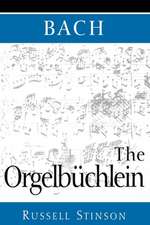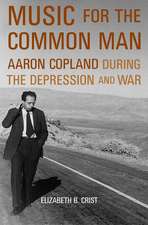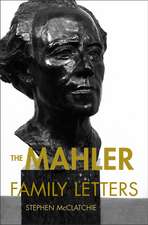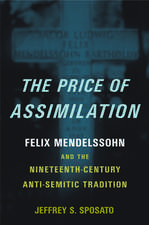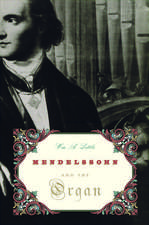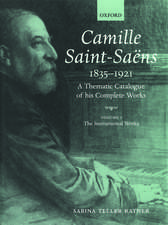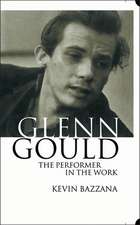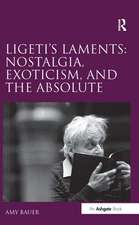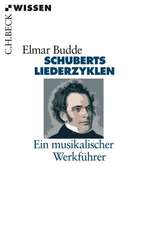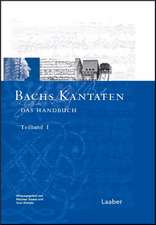Industry: Bang on a Can and New Music in the Marketplace
Autor William Robinen Limba Engleză Hardback – 21 apr 2021
Preț: 179.10 lei
Preț vechi: 195.91 lei
-9% Nou
Puncte Express: 269
Preț estimativ în valută:
34.27€ • 35.87$ • 28.52£
34.27€ • 35.87$ • 28.52£
Carte disponibilă
Livrare economică 27 februarie-05 martie
Preluare comenzi: 021 569.72.76
Specificații
ISBN-13: 9780190068653
ISBN-10: 0190068655
Pagini: 320
Ilustrații: 30 images
Dimensiuni: 211 x 150 x 15 mm
Greutate: 0.36 kg
Editura: Oxford University Press
Colecția OUP USA
Locul publicării:New York, United States
ISBN-10: 0190068655
Pagini: 320
Ilustrații: 30 images
Dimensiuni: 211 x 150 x 15 mm
Greutate: 0.36 kg
Editura: Oxford University Press
Colecția OUP USA
Locul publicării:New York, United States
Recenzii
Aiding Robin in his efforts to weave the history of Bang on a Can through these broader vistas are his tremendous skills as a writer, honed through his experience as a professional music critic. The result is a book that is not only illuminating but also a genuine pleasure to read.
This book is a tribute to the survival of emerging musical forms.
Ready-made for introducing scholars, students, and the general public to the culture of new music in the late twentieth-century. Accessible and informative, Robin—in the spirit of his subject—has written scholarship that nonetheless just might reach new people.
This book is a tribute to the survival of emerging musical forms. Summing Up: Highly recommended.
This is an excellent book. It tells a series of interwoven stories – a tale of three composers and their music, a tale of a festival and its house band, a tale of new music in New York and how that music configured itself in relation to state and corporate funding. Industry is a reminder that a book with real scholarly significance can also be a good read.
Industry: Bang on a Can and New Music in the Marketplace, by William Robin, an assistant professor of musicology at the University of Maryland, is a colorful, insightful, and admirably evenhanded study of Bang on a Can in its early years and, by extension, of the creative upheavals in the music world at the end of the twentieth century.
Sparks vital conversation about what music based on solidarity might one day look like.
In the past decade, William Robin has established himself not only as one of America's most formidable younger musicologists but also as an incisive, eloquent writer in the public sphere. His study of Bang on a Can gives lavish evidence of his multisided brilliance: it is at once an absorbing historical narrative and an exacting work of critical analysis. No scholar or fan of contemporary American music can do without it.
One thing that becomes clear over the course of Industry is the degree to which the group's embrace of the market in practical terms amounted to an embrace of marketing.
This book is a tribute to the survival of emerging musical forms.
Ready-made for introducing scholars, students, and the general public to the culture of new music in the late twentieth-century. Accessible and informative, Robin—in the spirit of his subject—has written scholarship that nonetheless just might reach new people.
This book is a tribute to the survival of emerging musical forms. Summing Up: Highly recommended.
This is an excellent book. It tells a series of interwoven stories – a tale of three composers and their music, a tale of a festival and its house band, a tale of new music in New York and how that music configured itself in relation to state and corporate funding. Industry is a reminder that a book with real scholarly significance can also be a good read.
Industry: Bang on a Can and New Music in the Marketplace, by William Robin, an assistant professor of musicology at the University of Maryland, is a colorful, insightful, and admirably evenhanded study of Bang on a Can in its early years and, by extension, of the creative upheavals in the music world at the end of the twentieth century.
Sparks vital conversation about what music based on solidarity might one day look like.
In the past decade, William Robin has established himself not only as one of America's most formidable younger musicologists but also as an incisive, eloquent writer in the public sphere. His study of Bang on a Can gives lavish evidence of his multisided brilliance: it is at once an absorbing historical narrative and an exacting work of critical analysis. No scholar or fan of contemporary American music can do without it.
One thing that becomes clear over the course of Industry is the degree to which the group's embrace of the market in practical terms amounted to an embrace of marketing.
Notă biografică
William Robin is an assistant professor of musicology at the University of Maryland's School of Music. He has published work on contemporary music, orchestral culture, and early American hymns in the Journal of the American Musicological Society, Musical Quarterly, and the Journal of Musicology, and he contributes regularly to The New York Times.

